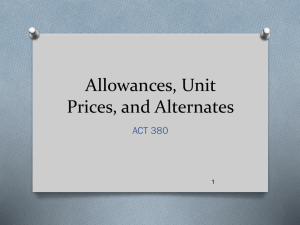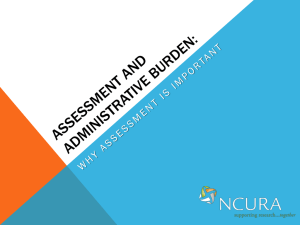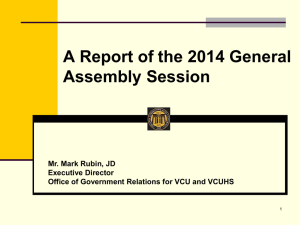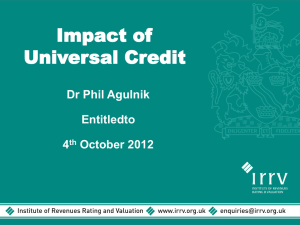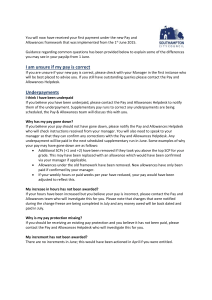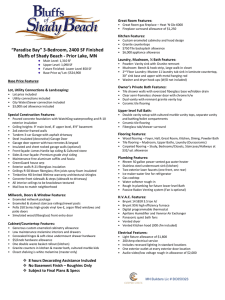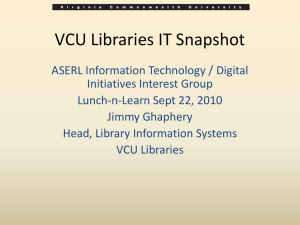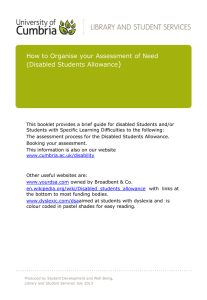Wireless Device Training - VCU Department of Human Resources
advertisement
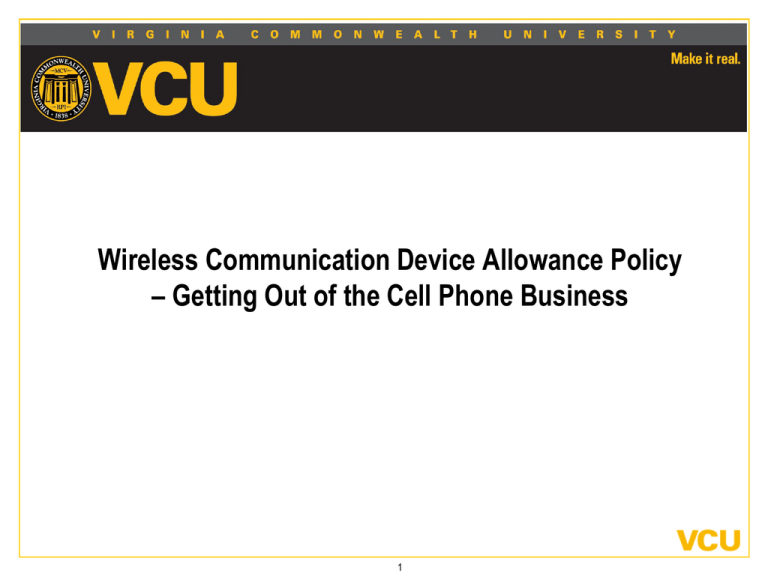
Wireless Communication Device Allowance Policy – Getting Out of the Cell Phone Business 1 VCU is migrating to a predominately allowance-based wireless communication device policy • VCU’s current cell phone policy states that university provided cell phones may not be used for personal purposes. State policy also requires telecommunications services be obtained through VITA state contracts, which are not competitively priced as compared with plans available in the general consumer market. • Approximately $800,000 is spent on cell phones and other wireless devices annually at VCU. • A review of current practices at other institutions indicates the growing use of allowances, rather than provision of devices: – James Madison University - University of Denver – Old Dominion University - Central Michigan – University of Texas-Dallas - Florida International University – University of Toledo - University of Utah – University of Florida 2 Benefits include . . . • Cost savings. The allowances in VCU’s proposed policy are more favorable compared to mandatory state contracts which include the VITA mark-up. – For example, if the 398 Blackberry users were switched to the allowance, even if it was assumed that every one of them qualified for heavy data and heavy voice use, the monthly cost to VCU would still go down $8.25/device/month, for a savings of $39,402 annually. • Flexibility. Employees will be able to make their own choices relative to their wireless communication needs and, for employees who typically have been carrying two devices – one for personal and one for business – this change allows them to eliminate one of the devices. • Reduced risk. The university’s [audit] compliance risk increases when university devices are used in violation of the university’s Cell Phone policy, which expressly prohibits personal use. 3 What Does the Allowance Do? The allowance is designed to pay the business use portion of an employee’s personal cell or other wireless device bill 4 Allowance Levels Voice/Text Data • • • • • None Yes None/Baseline Low-Moderate Heavy $0 $20/mo $50/mo $40/mo $60/mo $90/mo Special use $ – such as international capability – VP approval required One-time payment up to $150 for purchase of a device during implementation Stipend rates will be periodically reviewed by Telecommunications Stipend will be considered taxable income to the employee Tax considerations have been taken into account when determining stipend levels 5 Equipment and Service • Employees entering the allowance program for the first time will need to acquire and maintain their own equipment. – Note: university-owned devices can be loaned to an employee; however, it will require a personal voice/data plan. • As before, personal cellular devices may not be purchased using any university funding source. • Employees should consider choosing a plan that will incorporate the amount of minutes that will be used for business and personal calls. • Vendors will require credit checks on new accounts. 6 Exceptions • Certain departmental group plans (e.g., Nextel Direct Connect – push-to-talk) • Rotating use of a departmental phone (e.g., on-call phone) • Grant funding specifically provides for wireless devices 7 Determining Allowances • Approval for an allowance will be granted in writing by the appropriate vice president. • Departments should use this opportunity to evaluate current use and level of business need. • Allowance amount will be based on business need. • Cell phone and data allowances will be based on one or more of the following criteria: – Safety – Required to be contacted on a regular basis – Required to be on-call – Essential personnel – Critical decision maker – Job function requires home or off-campus access to the Internet or university data services. – Other (please provide justification) 8 Terminating an Allowance • The allowance must end if: the employee resigns, is terminated from his/her job, transfers departments or no longer qualifies for a university stipend. • Because an allowance is tied to the job, timely paperwork must be submittted when employees leave or transfer. 9 Steps to Take – Approvals and Exceptions • Approvals – Carefully consider the need for an allowance and the appropriate level of reimbursement. – Complete a Department Head Worksheet and Employee Agreement form. – Allowances will be processed for the next payroll cycle upon arrival in VCU Payroll Services’ office. Allowances will not be processed retroactively. • Exceptions – Carefully consider the need to continue to pay for a university-owned device and service. – Complete the Exception to Policy Approval form. • Reminders: 1. Get approval for allowance. 2. Send form to VCU Payroll Services for processing on next payroll. 3. Work with Telecommunications to discontinue VCU plan within 30 days. 10 Steps to Take – Technology Services • Department contacts with access to the monthly bill will receive a list of all cellular devices within their departments, as billed through Telecommunications. • For each number, complete the fields shown in yellow below (draft version) Note: existing university-owned devices may be assigned to an employee on a temporary basis for use with the employee’s personal mobile plan. The device must be returned to the department’s fiscal administrator when the employee acquires his/her own device or leaves university employment. • University-owned devices not assigned are considered, and should be handled as, surplus property (see http://www.fmd.vcu.edu/ppd/surplus.html). • Requests for individual work orders will not be necessary. Telecommunications will initiate and manage the process for each department. 11 Steps to Take / Reminders – Payroll Processing • PHAREDS • Allowances will be paid from normal labor distribution. Process PHAREDS regularly if grants will not pay for allowances. • FLSA • Non-exempt employee usage outside of normal work hours must be documented on the weekly timesheet and compensated appropriately if overtime • LWOP • Allowances will be stopped while salaried employees are on leave with or without pay for more than 14 calendar days. • Hourly • Will continue to paid an allowance – even if they submit no work hours – until the job ends or the allowance is terminated by submitting a new worksheet. • Monitoring • Report will be available in the VCU Reporting Center for review. 12 Steps to Take – Procurement Services • Employees using personally owned cell devices may be personally reimbursed for business calls when: • shown to be out of necessity (e.g., university or other landline phone was not practical, available, etc.); and • business calls are not part of the employee’s base minutes. • If base minutes are used for university business calls, employees will not be reimbursed for those calls or any portion of the base rate. 13 Resources • Technology Services / helpIT Center: 828-2227 • Payroll Services: 828-0740 • Procurement Services: 628-2886 or 828-3377 14

